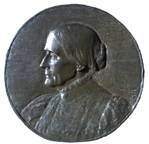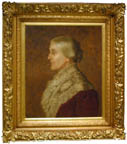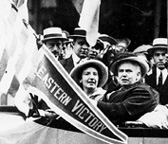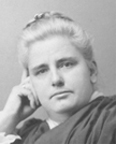The Suffrage Cause and Bryn
Mawr
Susan B. Anthony
 In
1901 M. Carey Thomas's surgeon, Dr. Howard Kelly, offered to donate a large
bronze medallion of Susan B. Anthony to Bryn Mawr College. Kelly and President
Thomas turned the presentation into a celebration in which Anthony herself could
be honored, and where Anthony could introduce the topic of women's suffrage
to the students in earnest.
In
1901 M. Carey Thomas's surgeon, Dr. Howard Kelly, offered to donate a large
bronze medallion of Susan B. Anthony to Bryn Mawr College. Kelly and President
Thomas turned the presentation into a celebration in which Anthony herself could
be honored, and where Anthony could introduce the topic of women's suffrage
to the students in earnest.
Anthony's secretary originally arranged for the renowned British suffragist,
Florence Fenwick Miller (1854-1935), to accompany and assist Anthony. However,
Miller ultimately preceded Anthony and thus became the College's first major
suffrage speaker.
On April 21, 1902, Anthony arrived on campus with Anna Howard Shaw, Vice President
at Large of the National American Woman Suffrage Association. Dr. Kelly introduced
Anthony and presented a list of her accomplishments and work for women's rights.
After another introduction by Thomas, Anthony addressed the audience for half
an hour. She concluded her speech by saying, "We are the only intelligent
class of people under the shadow of the American flag that has no voice in the
government."
Anthony's second visit to Bryn Mawr, again with Anna Howard Shaw, occurred
in November 1905. They met privately with M. Carey Thomas and Mary E. Garrett
to make arrangements for the 1906 Baltimore NAWSA convention. This convention
would be Anthony's last.
 In
the fall of 1920, President Thomas addressed the Bryn Mawr College community
on the recent donation of a painting of Susan B. Anthony :
In
the fall of 1920, President Thomas addressed the Bryn Mawr College community
on the recent donation of a painting of Susan B. Anthony :
It is a very great satisfaction to celebrate our first formal meeting together
after our enfranchisement by the gift to the College of the portrait of a
great woman who gave her life to give us the vote. This portrait of Susan
B. Anthony was painted in 1902, when she was eighty years old, by Miss Sarah
J. Eddy, who was both an artist and her friend. It is one of three replicas.
...At this glorious time, when woman is celebrating her enfranchisement,
Miss Anthony takes her place for all time beside the greatest man of America,
Lincoln, our savior from fatal partition, our liberator from human slavery,
as the greatest woman of America, the foremost pioneer of all the great suffrage
pioneers - like Lincoln infinitely wise, unfathomably tender, unalterably
true; like him consumed by an unquenchable passion for human liberty, distinguished
from all the other men or women I have known by the quality of sheer unadulterated
greatness that made of her the heaven-sent leader of our suffrage cause.
During the correspondence relating to the medallion presentation ceremony,
Anthony introduced Carey Thomas to Anna Howard Shaw. She wrote:
If you want a good evening and want a woman suffrage lecture, or a college
woman's hard experience - a woman who commenced her studies with nothing and
worked her way through college and through the theological school by the hardest
- Rev. Anna Shaw would give your girls a good lesson, and there is no one
for whom I like to hold the bonnet better than for Miss Shaw.
Letter from Susan B. Anthony to M. Carey Thomas, February
1, 1902. M. Carey Thomas Papers, Special Collections, Bryn Mawr College Library.
Anna Howard Shaw
 Anna
Howard Shaw was president of the NAWSA from 1904-1915 and was known for her
great oratorical gifts. She was among the first women to be ordained by the
Methodist Protestant Church. Shaw also earned a medical degree from Boston University
in 1885.
Anna
Howard Shaw was president of the NAWSA from 1904-1915 and was known for her
great oratorical gifts. She was among the first women to be ordained by the
Methodist Protestant Church. Shaw also earned a medical degree from Boston University
in 1885.
Instead of focusing on her training, Shaw dedicated much of her career to the
suffrage movement. But despite her speaking skills, commitment to the cause
and impressive resume, Shaw was criticized for her ineffective leadership. The
phase of suffrage history during which Shaw was the leader of NAWSA saw few
major victories and the NAWSA was thought by many to have been too quiet a force
during her tenure.
Shaw was the most frequent of the national suffrage figures to visit Bryn Mawr.
Following her introduction to M. Carey Thomas and Mary Garrett in 1902, she spoke
publicly on campus at least nine times, often at the invitation of the College
Equal Suffrage League. "The suffrage cause and Bryn Mawr. . . are the two
dearest interests I have in the world," Shaw wrote to Thomas in 1911. She
was the keynote speaker at Mary E. Garrett's campus memorial service in 1915.
 In
a 1914 letter home, Helen Robertson '16 described one of Shaw's talks and her
speaking skills:
In
a 1914 letter home, Helen Robertson '16 described one of Shaw's talks and her
speaking skills:
Last evening the Reverend Anna Howard Shaw spoke under the auspices of the
College Equal Suffrage League. I went rather to be able to say I had heard
her than because I expected to get much out of it. I soon changed my mind
however. She is quite an elderly woman, plump and pretty with snow white hair
- not at all the accepted type of elderly suffragette. And when she began
to speak I soon discovered she did not speak in the usual fashion. She has
a wonderful, dear voice . . . . She is the wittiest person I ever heard. Her
humor as incisive as a needle . . . . It was just a pleasure to listen to
her. She presented her facts with a mixture of personal anecdotes and plain
statistics that was at once persuasive and convincing. I wish I could tell
you half of the funny and interesting and inspiring things she said. I think
she has quite convinced me for the time being at any rate.
Following Shaw's death in 1919, Thomas and Bryn Mawr College established an ongoing
lecture series in her honor. A memorial fund to benefit the suffrage movement
also was established at Bryn Mawr in Shaw's memory and was first chaired by Edna
Fischel Gellhorn '00. Rev. Shaw's accomplishments are now commemorated on a plaque
in the Cloisters.
 The
Suffrage Cause and Bryn Mawr - More Speakers
The
Suffrage Cause and Bryn Mawr - More Speakers 
 In
1901 M. Carey Thomas's surgeon, Dr. Howard Kelly, offered to donate a large
bronze medallion of Susan B. Anthony to Bryn Mawr College. Kelly and President
Thomas turned the presentation into a celebration in which Anthony herself could
be honored, and where Anthony could introduce the topic of women's suffrage
to the students in earnest.
In
1901 M. Carey Thomas's surgeon, Dr. Howard Kelly, offered to donate a large
bronze medallion of Susan B. Anthony to Bryn Mawr College. Kelly and President
Thomas turned the presentation into a celebration in which Anthony herself could
be honored, and where Anthony could introduce the topic of women's suffrage
to the students in earnest. 



